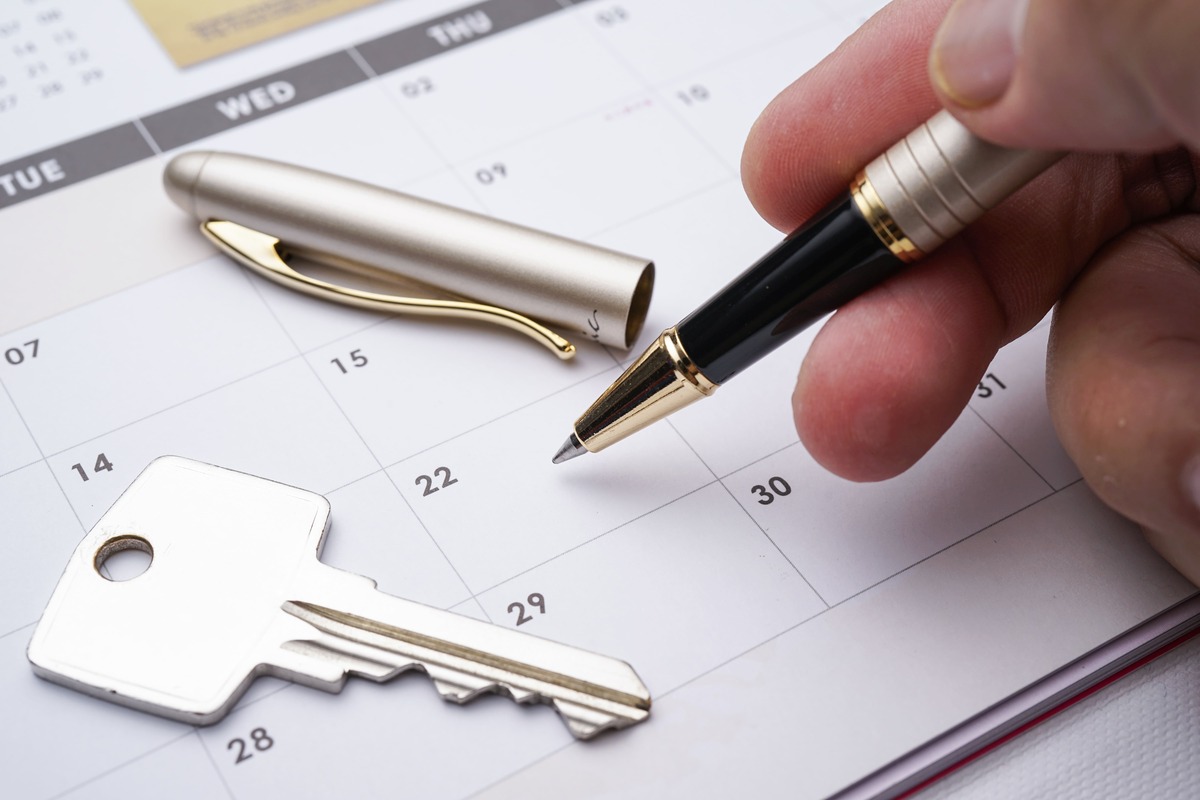- Compare agents
- Online valuation
- Explore my area
- Home toolkit
- News & guides


- Estate agents by area
- Sold house prices by area
- Estate Agent ValuationRequest an in-person valuation with an agent to discover your property's true market value.
- Online Valuation ToolGet a free instant estimate of your home's value.
- EPC CheckerFind out if your home has a valid Energy Performance Certificate.
- Listing MonitorAlready on the market? See how your online property advert is performing.
- Selling guides
- Estate agent guides
- Mortgage advice
- Conveyancing guides
- Property news See All News & Guides

Agent shortlist

HouseWorth
- How long will conveyancing take?
Conveyancing help and guides26 October 2019
How long will conveyancing take?
Rosie Hamilton
Writer & Researcher

Table of contents
As a seller, there’s no set time to appoint a conveyancer, as long as you have a legal team in place by the time you receive a formal offer. It’s a good idea to pick who you want to work with around the same time as you choose your estate agent. This will give you time to shop around for the best provider, and by the time you receive an offer you’ll have your entire selling team on the same page.
If you’re buying a home, you’ll need to appoint a conveyancer by the time your offer is accepted and you’re arranging your finances. Sometimes your mortgage provider will have a panel of preferred legal representatives you might need to choose from.
Generally there’s no harm in appointing a conveyancer as early as you can. If you’re unsure whether a purchase is going to complete - if you need to arrange your finances for example - you can always instruct a lawyer but ask them not to incur any expenses until you’re ready to move forward.
How long will conveyancing take?
The time it takes to complete will vary depending on the location of your property and whether your buyer needs to arrange a mortgage. On average you should expect the conveyancing process to take around 2 or 3 months.
How long will conveyancing take with no chain?
A ‘chain’ in conveyancing terms refers to a situation where there are multiple people buying and selling properties at the same time. Each person’s ability to buy a new home relies on a sale taking place.
When there’s no chain the conveyancing process is much simpler. There are fewer people for the lawyer to coordinate with, reducing the likelihood of complications and delays. In this case the process can take as few as 8 weeks, and could even be completed in 4-6 weeks.
However, even without a chain, there are still a number of things that can cause a delay. A survey could bring something unexpected to light, or the other party could be slow to respond to enquiries. You’re reliant on your conveyancer, the other person’s conveyancer, and the estate agent to all work efficiently together. They will need to communicate effectively and proactively to push the transaction forward.
How long will conveyancing take for a leasehold?
The conveyancing process tends to take longer for leasehold properties than freeholds. This is because there is another person - the landlord - now involved. This creates more work for the lawyer, and a potential time delay, as another individual has to respond to enquiries.
Leasehold conveyancing can take at least 8-10 weeks, but shouldn’t take longer than 3 months if there’s no chain. If the sale is dependent on the success of other ‘links’ the process can end up taking up to 6 months.
Read more about selling a leasehold here.
What are conveyancing searches?
Searches provide you with more information about the property you hope to buy. They are enquiries submitted by your lawyer to the relevant authorities who will return with further details.
When you buy a property you don’t just buy the building itself. You become accountable for any issues associated with it. These could include things like: flood risks, contaminated land, or any debt secured against it. Searches will provide the information you need to make an informed decision about whether to proceed with the purchase or to renegotiate the terms of your offer.
Searches will also let you know whether there’s planning permission approved for developments near you. You may find out a motorway is scheduled for construction nearby, or that your view will be affected by a new skyscraper. These sort of findings might affect your decision to buy, or the amount you’re willing to pay.
Searches are compulsory if you’re applying for a mortgage, but if you don’t need to borrow money you aren’t required to have them. Not doing searches could save time during the conveyancing process. But, unless you’re very confident in your personal research, searches are a wise precaution. They’ll ensure you know exactly what you’re purchasing, and could save you money in the long term. Searches cost a few hundred pounds, but the consequences of having to rectify unexpected issues could cost you thousands.
How long do searches take?
If you’ve already instructed your conveyancer, they will order most searches as soon as the buyer has formally accepted your offer. Many basic searches can be completed in under 10 days. However, in some areas it’s not unusual for Local Authority Searches to take up to six weeks.
Surveys that take 1-10 days: Water and Drainage Search Environmental Search Chancel Repair Search Flooding Search Contaminated Land Search Coal, Brine, Clay and Tin Mining Search Bankruptcy Search Indemnity Search Title Searches Land Registry Priority Searches
10 days to several months: Preliminary enquiries to seller’s solicitor Local authority searches - the time it takes to complete these varies dramatically around the country Commons registration search
How to speed up conveyancing
Preparation and planning can do a lot to speed up the conveyancing process. If you’re buying, the first things the conveyancer will need are your proof of identity and a deposit to pay for incidentals such as searches. Have these ready so your lawyer can get to work straight away.
If you’re selling, there are several standard forms and pieces of information that every conveyancer will need. Getting ahead and filling out the Property Information Form (TA6) and the Fittings and Contents Form (TA10) can help get the ball rolling. If you don’t own the freehold for your property you’ll also have to provide further information on either the Seller’s Leasehold Information Form (TA7) or the Commonhold Information Form (TA9). Along with these forms make sure you have any documents relating to planning permission, or guarantees for work done, ready to share with your lawyer.
Once the conveyancing process is underway you can speed up the process by requesting a shorter time between exchange and completion. This usually takes about 2-4 weeks, but you can try and work to a shorter time frame - some people even exchange and complete on the same day. Discuss the options with your conveyancer to see if this is possible for you.
During the day-to-day of the process, poor communication is one of the quickest ways to slow down a sale. Keeping in touch with the estate agent and the other party will help make sure small issues don’t hold up the conveyancing process. Making sure you are prompt in carrying out tasks and returning paperwork will also encourage a speedier process.
What to do if your conveyancer is slow
It’s important to appreciate that certain aspects of a conveyancer’s work depend upon other people. They aren’t always in control of how quickly things move. However, there is a certain level of pace and communication you should expect, particularly if you’ve made an effort to be as proactive and responsive as possible.
As a general rule, if you’ve instructed a legal firm that hasn’t come back to you within the first week, it’s a clear sign that they don’t have the capacity to be proactive in dealing with your case. You should expect a response to any communication within 24-48 hours.
If you’ve tried to speed up the conveyancing process but are still unsatisfied, and you believe your conveyancer is so slow that they could jeopardise completion, you are within your rights to make a complaint. You can sue a legal firm if they don’t achieve a completion date they’ve committed to, especially if they delay is their own fault.
In the worst case scenario, you can change legal firm. This is most effective earlier in the conveyancing process. It’s rarely worth switching once the exchange has taken place, as most of the work will have been completed by then.
If you do make the decision to switch, reading your legal firm’s terms and conditions will help you figure out how to proceed. Check what specific terms there are regarding de-instruction. How much will you need to pay for work already done? Will switching conveyancer affect your mortgage offer? Who will take responsibility for handing over paperwork and money to the new firm?
Switching conveyancer may not necessarily shorten the conveyancing process. If the other party’s legal firm has already sent the paperwork, it may take some time to redirect, or your new legal representative may have to start from scratch. And, one of the biggest potential delays occurs if your original legal firm holds the title deeds to the property and they need to send them back to your mortgage company before they can be sent on to the new conveyancer.
However, your new legal representative should make the transition as smooth and quick as they can. The slight delay could be worth the peace of mind of working with a conveyancer you have confidence in.
We get down to the basics of conveyancing in our handy guide. Check it out, here.
Thinking about
selling your home?
Picking the right estate agent is vital for a successful sale. GetAgent makes choosing simple. Discover the best performing agents in your area.
- Free
- Data-driven
- No obligation
Thinking about
selling your home?
Picking the right estate agent is vital for a successful sale. GetAgent makes choosing simple. Discover the best performing agents in your area.
- Free
- Data-driven
- No obligation

Compare estate agents
It takes 2 minutes.
Our company
Get in touch
020 3608 6556
Our lines are closed
We are a company registered in England & Wales, company number 09428979.
Copyright © 2026 GetAgent Limited








